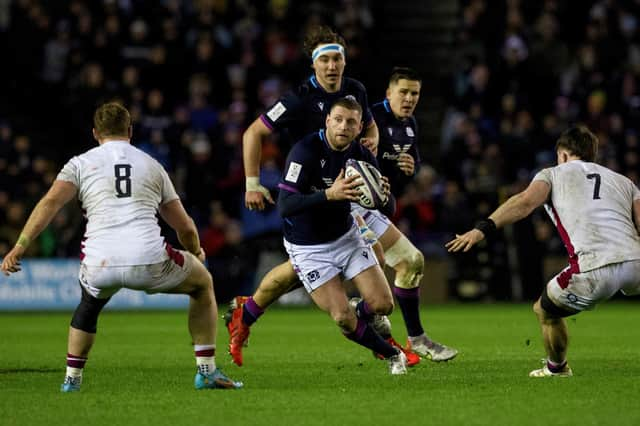Allan Massie: Scotland must do certain things better against Wales - but we must celebrate the reasons for our improvement


That we held on and came through to win deservedly was due to the quality of defence and to this team’s ability to create and take chances even after long periods of being on the back foot. I should also pay tribute to the accuracy of Finn Russell’s goal-kicking, especially after the doubts I expressed last week about having to rely on a player who is only an occasional – even a very occasional – goal-kicker for his club.
Of course, it was also a narrow victory against what is a less than outstanding England team. Indeed, when Eddie Jones is in Rome this weekend, he might give thanks to Italy for their recent role in the tournament. If it was still the Five Nations rather than the Six, he would now have two Wooden Spoons in his trophy cabinet.
Advertisement
Hide AdAdvertisement
Hide AdThere are many reasons for Scotland’s improvement since. First, Vern Cotter and, then, Gregor Townsend took over. One certainly is the number of players who have been developed in the Scotland training camp and been successfully capped in non-Six Nations internationals. There were many good players in the Scotland side in the first decade and more of the century, players certainly of a quality which would have made them very welcome at any time. But there were almost always a few who would never, one thought, even then, have played international rugby if they had been English or Welsh.
For some time we have had to accept that professional rugby is now a 23-man game, no longer a 15-man one. It was noticeable for years that while some of our opponents were regularly able to bring on players as good as those they were replacing, we weren’t. So, often, the “fresh legs” of replacements strengthened our opponents while our ones didn’t. This is no longer the case and it makes a difference.
In this context, the selection for today’s match in Cardiff is interesting. The front-row that started against England is on the bench, while the one that replaced it will play the first half and a few minutes. Now this may be a reward for the good work of last week’s replacement trio. But, given that Rory Sutherland and Zander Fagerson are two of our current Lions and that George Turner – whose throwing into the line-out was exemplary – may now be our best hooker, it looks as if Gregor is taking a leaf out of the Springbok book, for South Africa, conscious that, while matches may be lost in the first half they are more usually won in the second, have made a habit of saving their stronger and more skilful front row for the second half of the match.
Last season, after winning at Twickenham, we lost to Wales at Murrayfield. It was only by a single point, nevertheless deeply disappointing because the match turned on the last ten minutes of the first half, the worst ten minutes we played in the tournament.
Now we go to Cardiff and, though Wales were poor in Dublin last week and have a number of experienced players still unavailable today, winning in Cardiff is rare. The 1990 Grand Slam team, for instance, only narrowly defeated a Welsh team coming off a heavy defeat at Twickenham..
Scotland surely need to make a brisker start than they managed last week when England dominated the first quarter and we won scarcely any ball, none of it what is called “go-forward ball”. A similar start might go some way to repairing Welsh confidence and would surely enliven the crowd. In Dublin, Wales were knocked back by Ireland’s try in the third minute and never recovered. But if they start well today they may soon look a very different team.
Scotland’s defence coped with everything England tried, but, for the back three anyway, today’s challenge may be more difficult, for an aerial bombardment from Dan Biggar is more testing than anything England threw at them. Stuart Hogg had one of his best games in defence last week; he may need an equally good one today. Of course, if the Scotland forwards get on top, keeping on the right side of the referee and supplying Ali Price with the clean quick ball of which there was very little at Murrayfield, the match would take on a very different look, for the Scottish back division, orchestrated by Finn Russell with his rich repertory of skills, is capable of penetrating or outflanking any defence. Hogg, Darcy Graham and Duhan van der Merwe have between them scored some 40 Test tries. Some more today, please.
A message from the Editor: Thank you for reading this article. We're more reliant on your support than ever as the shift in consumer habits brought about by Coronavirus impacts our advertisers. If you haven't already, please consider supporting our trusted, fact-checked journalism by taking out a digital subscription.
Comments
Want to join the conversation? Please or to comment on this article.